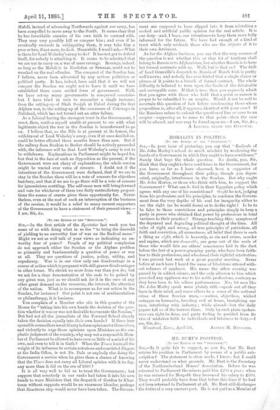MORALITY IN POLITICS.
[To THE EDITOR OF THE 4' SPECTATOR."] Su;,—In your issue of yesterday, you say that "Radicals of Mr. John Morley's school do much mischief by weakening the hands of a Government in which they ought to have confidence." Surely that begs the whole question. No doubt, you, Sir, think that they ought to have confidence in the Government, for you have, so far as I have observed, been a supporter of the Government throughout their policy, though you deprecated, originally, interference iu the Soudan. But why ought Mr. John Morley, or those who think with him, to support the Government ? What can he find in their Egyptian policy which agrees with any one of his convictions ? Ought he not, judging from his professions and his principles, to condemn the Government from the very depths of his soul for incapacity either to see the right (as he would deem) or to do the right ? Is ho to be false to those convictions and principles' simply to keep a party in power who obtained that power by professions in total variance to their practice ? Strange teaching this ; symptom of the depraved and degrading political thought of the time. All rules of right and wrong, all true principles of patriotism, all faith and conviction, all earnestness, all belief that there is such a thing as right, which is heavenly, as sin and crime, murder and rapine, which are damnable, are gone out of the souls of those who would fain see others' consciences laid in the dust before the feet of a power-grasping party, who have been faithless to their professions, and who dread their rightful retribution. I was present last week at a great popular meeting. Never before at such have I beard the name of Gladstone uttered without volumes of applause. His name the other evening was passed by in coldest silence, and the only allusion to him which provoked any applause was to his noble professions, contrary as they have been to his odious performances. No; let men like Mr. John Morley speak more plainly still,—speak out all they have in their mind, and rouse others to a sense of the national crime of these Soudan wars, — useless, objectless, wicked outrages on humanity, breeding evil at home, brutalising our race, interfering with industry ; while abroad—but the daily papers tell us of the horrors there. Only by such plain-spokenness can right be done, and party feeling be purified from its vice of mistaken faith to individuals and falseness to duty.—I am, Sir, &c., 117anstcad, Essex, April 5111. ALFRED H. HAGGARD.


































 Previous page
Previous page